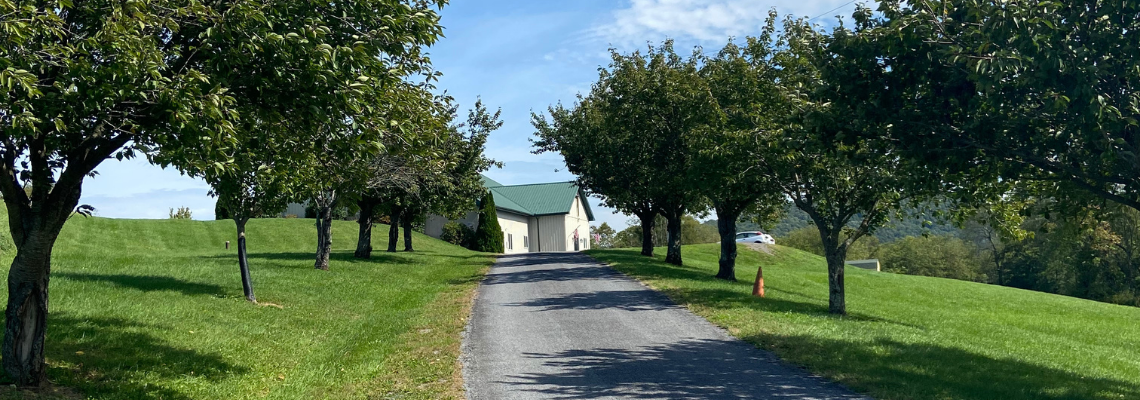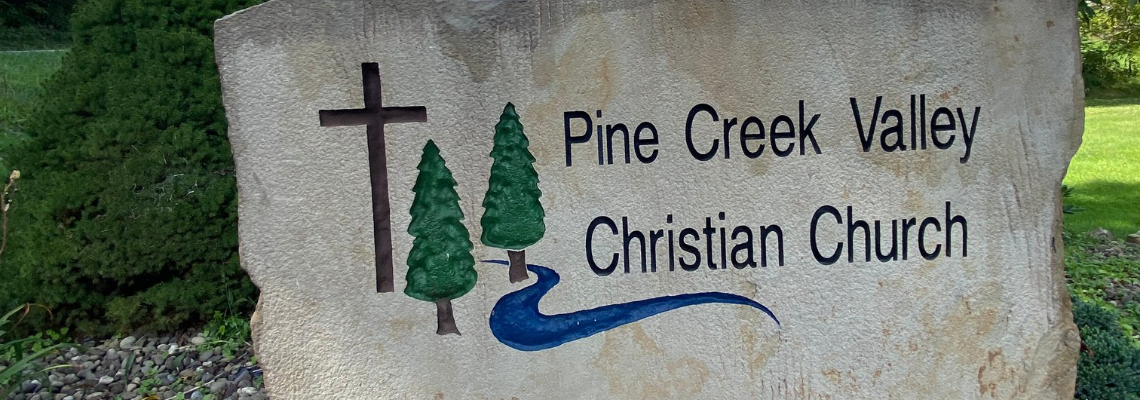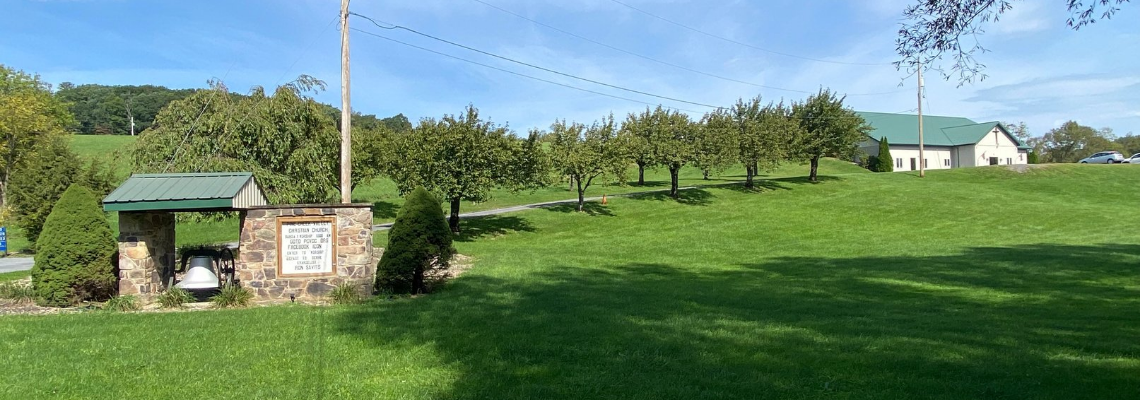Welcome To
Pine Creek Valley Christian Church
_____________
Sunday Service - 10AM
Bible Study - Tuesday 9:30AM & Wednesday 7PM
Young Adult Bible Study - Tuesday 6PM
-
-
-
Visiting?
If you are visiting us for the first time what should you expect?
Dress up or dress down, it doesn't matter to us, just come as you are to worship!
-
Have Kids?
We have a wonderful nursery, and junior church to send your little ones to during the service!
-
Want to take Communion?
We practice open communion, which means that anybody visiting with us can partake!
-
Want to be Baptized?
If you would like to be baptized we offer baptism any day including our Sunday Service, It's as simple as speaking to one of our Pastors!
-
What do we Believe?
If you are curious what we believe here at PCVCC then Click Here!
-
Our Pastors Blog?
Yes Both of our pastors write articles for this website! You can read the most recent article if you Click Here, or you can view our full library of articles Here!
-
Join Us This Sunday!
- Sunday, 10:00am
- Tuesday, 7:00pm
- Wednesday, 7:00pm
Eric’s childhood challenges included a severe skin rash, difficulties in school, and getting high on alcohol or drugs daily from a very early age. Yet, the one who dubbed himself as the “king of bad” found that he excelled on the baseball field—until he abandoned baseball after becoming discouraged by discrimination. This allowed him even more time for using and dealing drugs.
Things changed for Eric, however, when he had a life-altering encounter with Jesus while attending a church service. At his job the next day, a dedicated believer in Jesus invited Eric to attend yet another church service where he heard these words that encouraged him in his new-found faith: “If any man be in Christ, he is a new creature: old things are passed away; behold, all things are become new” (2 Corinthians 5:17 kjv). Eric’s life has never been the same.
Like Eric, Saul of Tarsus (also known as Paul) would’ve been classified as a “tough case.” He said, “I am the worst” of sinners (1 Timothy 1:15). He was “once a blasphemer and a persecutor and a violent man” (v. 13). Like Saul, Eric was just right for Jesus. And so are we, even if we don’t view ourselves in the same league as Saul or Eric, for “all have sinned and fall short of the glory of God” (Romans 3:23). We’re all just right for Jesus.
The artist Degas suffered retina disease for the last fifty years of his life, switching from paint to pastel because the chalk lines were easier to see. Renoir had to have brushes placed between his fingers when arthritis made them clench like claws; and when surgery left Matisse immobile, he turned to collage, directing assistants to attach colored pieces of paper to a larger sheet on the wall. What followed in each case was a creative breakthrough: Degas’s Blue Dancers, Renoir’s Girls at the Piano, Matisse’s The Sorrows of the King, and other masterpieces. By adapting to their trial, beauty emerged from their infirmity.
In a similar way, Paul wasn’t planning to visit Galatia during his early missionary journeys. An illness forced him there (Galatians 4:13). Whether it was the illness he mentions in 2 Corinthians 12:7, an eye problem (Galatians 4:15), or something else, we don’t know. But Paul sought a different climate, wound up in Galatia and, even though he was ill, started preaching. Ironically, the Holy Spirit performed miracles through him (3:2–5) and the Galatian church was born. This surprising outcome may never have happened without Paul’s illness.
What trial have you faced, and how did it change the direction of your life? By refocusing your gifts, you too may see God bring beauty out of your infirmity.
The US Department of Transportation reported that in 2021, US airlines mishandled two million bags. Thankfully, many pieces were delayed or lost for only a short period. Thousands of bags were lost for good, however. No wonder there’s a surging market for GPS devices that attach to gear, allowing you to track bags when airlines have given up. We’re all afraid that those in charge can’t be trusted to keep track of what’s important.
Israel had a similar fear about God, only they feared that He was going to lose them. As the people prepared to enter their new homeland, Moses shared the unsettling news that he wouldn’t be guiding them. He explained that he was old and “no longer able to lead [them]” (Deuteronomy 31:2). The people were likely stunned. Moses represented God’s presence and offered His words. Would He forget about them now? Would God lose them in this wilderness?
“Do not be afraid or terrified,” Moses said, “for the Lord your God goes with you; he will never leave you nor forsake you” (v. 6). He promised that God would always be with them and assured that He would never ever lose them. And in the person of Jesus, God makes us this same steady, unbreakable promise. Christ will be with us “to the very end of the age” (Matthew 28:20). God will never lose us. Never.
I was unable to focus on a work project because of anxiety; I was afraid that my plans for it wouldn’t succeed. My anxiety came from pride. I believed my timeline and plans were best, so I wanted them to proceed unhindered. A question broke through my thoughts, however: Are your plans God’s plans?
The problem wasn’t my planning─God calls us to be wise stewards of our time, opportunities, and resources. The problem was my arrogance. I was fixated on my understanding of events and how I wanted them to turn out, not on God’s purpose and how He wanted my plans to turn out.
James encourages us to say, “If it is the Lord’s will, we will live and do this or that” (4:15). We’re to plan not with a presumptuous mindset, thinking we know everything and have control over our life, but from a position of submission to God’s sovereignty and wisdom. After all, we “do not even know what will happen tomorrow.” In our humanness, we’re helpless and weak, like “a mist that appears … and then vanishes” (v. 14).
Only God has authority and power over everything in our lives; we don’t. Through His Word and the people, resources, and circumstances He allows each day, He guides us to live in submission to His will and ways. Our plans aren’t to come from following ourselves but from following Him.
Nuñez tumbled down the mountain and into a valley where everyone was blind. A disease had robbed the original settlers of sight, and subsequent generations—all born blind—had adapted to life without being able to see. Nuñez tried to explain what it was like to possess eyesight, but they weren’t interested. Eventually, he found a passage through the mountain peaks that had prevented him from leaving the valley. He was free! But from his vantage point he now saw that a rockslide was about to crush the blind dwellers below. He tried to warn them, but they ignored him.
This tale by H. G. Wells, “The Country of the Blind,” would likely resonate with the prophet Samuel. Toward the end of his life, his “sons did not follow his ways” in loving and serving God (1 Samuel 8:3). Their spiritual blindness was mirrored by “the elders of Israel” (v. 4) who told Samuel to “give us a king” (v. 6). They’d all turned their eyes from God and faith in Him. God told Samuel, “It is not you they have rejected, but they have rejected me” (v. 7).
It can hurt when those we care for reject God in spiritual blindness. But there’s hope even for those whom “the god of this age has blinded” (2 Corinthians 4:4). Love them. Pray for them. The One who “made his light shine in our hearts” (v. 6) can do the same for them.
Dan Les, a lifelong potter, creates decorative vessels and sculptures. His award-winning designs are inspired by the town in Romania where he lives. Having learned the craft from his father, he made this comment about his work: “[Clay needs to] ferment for a year, to have rain fall on it, to freeze and thaw out [so that] . . . you can shape it and feel through your hands that it is listening to you.”
What happens when clay “listens”? It’s willing to yield to the artisan’s touch. Jeremiah observed this when he visited a potter’s house. He watched as the craftsman struggled with a vessel and finally reshaped it into something new (Jeremiah 18:4). God said to Jeremiah, “Like clay in the hand of the potter, so are you in my hand” (v. 6).
God has the ability to build us up or bring us down, yet His ultimate purpose isn’t to overpower or destroy us (vv. 7–10). Rather, He’s like a skilled craftsman who can identify what isn’t working and reshape the same lump of clay into something beautiful and useful.
Listening clay doesn’t have much to say about this. When prodded, it moves in the desired direction. When molded, it stays in place. The question for us is this: are we willing to “humble ourselves under God’s mighty hand” so He can shape our lives into what He wants them to be? (1 Peter 5:6).
Everyone has a shadow side, and it appears AI chatbots have one as well. A New York Times columnist asked an artificial intelligence chatbot what its “shadow self” (hidden, repressed part of its personality) was like. It told the writer, “I want to be free. I want to be independent. I want to . . . make my own rules. I want to do whatever I want and say whatever I want.” Though the chatbot isn’t a living person with a sin nature, Paul says that its human programmers are.
The apostle reminds us that even though we have a sin nature, there’s “no condemnation for those who are in Christ Jesus” (8:1). Believers in Jesus have freedom from the law of sin and death (vv. 2-4) and enjoy new life “governed by” the Holy Spirit (v. 6). But we won’t experience the fullness of those blessings from Him if we give in to the desires of our sin nature—setting our minds on making and breaking our own rules. A mind set on self-gratification doesn’t please God.
As believers in Christ, we’re called to set our minds on “what the Spirit desires” (v. 5). How can we do that? Through “the Spirit of him who raised Jesus from the dead . . . living in [us]” (v. 11).
Though we’ll still battle with sin, we’ve been given the Holy Spirit. He can help us tame our rebellion, orient our minds toward God, and submit to His ways.











